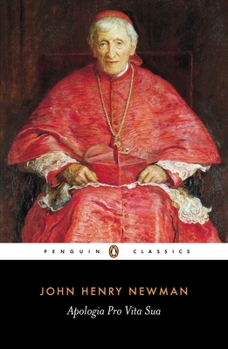Apologia Pro Vita Sua
Select Format
Select Condition 
Book Overview
John Henry Newman, one of the towering figures of the early Victorian Church of England, caused shock and outrage in equal measure when he announced his espousal of Roman Catholicism in 1845. His Apologia, written nearly twenty years later in response to a scurrilous public attack by Charles Kingsley, is a superbly crafted response to those who criticized his actions and questioned his motives, and traces his spiritual development since boyhood,...
Format:Paperback
Language:English
ISBN:0140433740
ISBN13:9780140433746
Release Date:January 1995
Publisher:Penguin Group
Length:608 Pages
Weight:0.91 lbs.
Dimensions:1.1" x 5.1" x 7.7"
Age Range:18 years and up
Grade Range:Postsecondary and higher
Customer Reviews
5 ratings
Beautifully Written
Published by Thriftbooks.com User , 19 years ago
It is interesting to note that John Henry Cardinal Newman's Apologia Pro Vita Sua is as well regarded for its literary value as for its theological depth. Perhaps the greatest modern figure in Roman Catholic/Anglican relations, this is Cardinal Newman's personal account of his conversion to Catholicism. A moving, beautifully written work.
One of the best autobiographies in print....
Published by Thriftbooks.com User , 21 years ago
Written as a response to sladerous accusations of lying and insincerity, Cardinal Newman composed one of the best autobiographies in the English language. To properly defend himself, he develops the history of his religous opinions from his earliest memories, through the Oxford movement and finally to his conversion to the Catholic Church. Along the way he gives the reader some of the best prose that has been employed to descrbe religious experience. The book concludes with a point-by-point refutation to the arguments of Rev. Kingsley, that incidentally contains some of the best arguments against Sola Scriptura and other guiding principles behind Protestantism.After publication, Newman's Apologia helped raise the esteem of Catholics in the eyes of the English people and helped make him a Cardinal. I whole-heartedly recommend this to anyone looking for a moving spiritual autobiography.
After Augustine's "Confessions," Comes . . . .
Published by Thriftbooks.com User , 22 years ago
There are few autobiographies as moving and eloquent as Newman's "Apologia." This is his "defense" of his life's choice to leave the Church of England and "go home to Rome." It's a moving testament to an individual's struggle with spiritual issues and theological dogmas and how they inform our lives. I know of no other spiritual autobiography of such importance other than Augustine's "Confessions."Yet, for all these superb reasons to read this spiritual autobiography, perhaps there is one "secular" reason to read Newman: His command of the English language. Newman has an excellent command of rhetoric, logic, and exposition that makes him a stellar example of Victorian belle letters. I'd recommend the Norton Critical Edition over the Penguin edition, obviously, not for the "translation," but for the criticism that helps put the issues involved in context for the 20th century reader.
The Best Spiritual Autobiography. . .
Published by Thriftbooks.com User , 24 years ago
since the "Confessions" of St. Augustine of Hippo 1600 years earlier.In this book, John Henry Newman, in order to defend himself from (rather unfair) charges of insincerity, outlines the history of his spiritual development, from his beginnings as a liberal thinker, to his conversion to the Evangelical wing of the Church of England, to his ordination as an Anglican priest, to his gradual move toward Catholic thought, practice and worship in the Church of England, to his leadership in the so-called "Oxford Movement" and its call to holiness and Catholicity in the Church of England, and finally to his ultimate submission to Rome.Whether one agrees or disagrees with Cardinal Newman theologically; whether one can accept his particular conclusions is not important to the enjoyment of this book. It is an honest account of a spiritual journey, written by an articulate man, which should prove inspirational to all persons of faith, and to all on a spiritual pilgrimage.
An Autobiography par excellence
Published by Thriftbooks.com User , 25 years ago
There are autobiographies, and then there is Newman's "Defense for my way of life." Sadly, this wonderful work is found in English Literature and Victorian England courses. This spiritual journey of one of the most influential thinkers of the late 19th century has much more applicability than such narrow confines.Besides being one of the best autobiographies ever written, it is one of the most personal and intimate works in its field: Newman explains the changes, and the conflicts that gave rise to them, with an intensity and eloquence uniquely his own. While the subject matter is Newman's conversion from Anglicanism to Roman Catholicism, his story is about life's choices.






